- genevb's home page
- Posts
- 2025
- 2024
- 2023
- 2022
- September (1)
- 2021
- 2020
- 2019
- December (1)
- October (4)
- September (2)
- August (6)
- July (1)
- June (2)
- May (4)
- April (2)
- March (3)
- February (3)
- 2018
- 2017
- December (1)
- October (3)
- September (1)
- August (1)
- July (2)
- June (2)
- April (2)
- March (2)
- February (1)
- 2016
- November (2)
- September (1)
- August (2)
- July (1)
- June (2)
- May (2)
- April (1)
- March (5)
- February (2)
- January (1)
- 2015
- December (1)
- October (1)
- September (2)
- June (1)
- May (2)
- April (2)
- March (3)
- February (1)
- January (3)
- 2014
- December (2)
- October (2)
- September (2)
- August (3)
- July (2)
- June (2)
- May (2)
- April (9)
- March (2)
- February (2)
- January (1)
- 2013
- December (5)
- October (3)
- September (3)
- August (1)
- July (1)
- May (4)
- April (4)
- March (7)
- February (1)
- January (2)
- 2012
- December (2)
- November (6)
- October (2)
- September (3)
- August (7)
- July (2)
- June (1)
- May (3)
- April (1)
- March (2)
- February (1)
- 2011
- November (1)
- October (1)
- September (4)
- August (2)
- July (4)
- June (3)
- May (4)
- April (9)
- March (5)
- February (6)
- January (3)
- 2010
- December (3)
- November (6)
- October (3)
- September (1)
- August (5)
- July (1)
- June (4)
- May (1)
- April (2)
- March (2)
- February (4)
- January (2)
- 2009
- November (1)
- October (2)
- September (6)
- August (4)
- July (4)
- June (3)
- May (5)
- April (5)
- March (3)
- February (1)
- 2008
- 2005
- October (1)
- My blog
- Post new blog entry
- All blogs
QA of preliminary pp500 SpaceCharge corrections
Using Hao Qiu's preliminary pp500 SpaceCharge distortion corrections, I have performed a few items of QA.
Jan Balewski produced some MuDsts for himself using the corrections, and I tried plotting K0 and Lambda invariant mass from the V0-finder output. In order to reduce the backgrounds due to pileup, I used cuts (I did not do any thorough study of cuts but chose these from some past experience of where signals can be found) of:
- abs(zv0-zPV) < 3 cm
- Ptv0 > 1 GeV/c
- Lambda: 5 cm < decay length < 13 cm
- K0: 2 cm < decay length < 8 cm
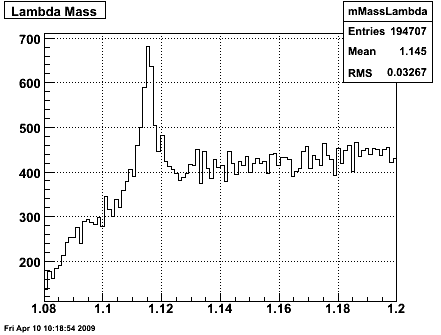
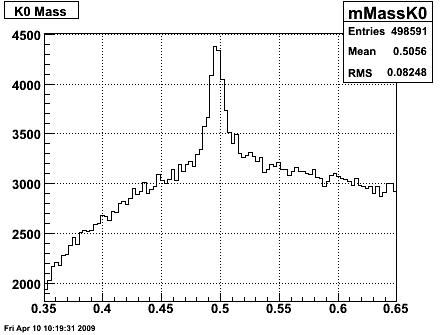
The K0 mass in particular is quite sensitive to the momentum of the daughters. My understanding is that the position and width of the K0 mass peak is reasonable, giving some confidence that the SpaceCharge corrections used are reasonable.
_______________
My next step of QA was to look at event.root files created for the TOF calibration production sample. Using the StSpaceChargeEbyEMaker on 600 events from 55 files, I found mean quantities for DCAs and SpaceCharge amounts. The calibration used zdcx (coincidence) as the luminosity measure. It appears that the amount of correction is a bittoo small, as seen by the mean dca vs. zdcx:
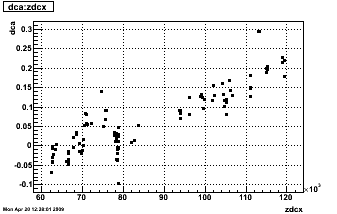
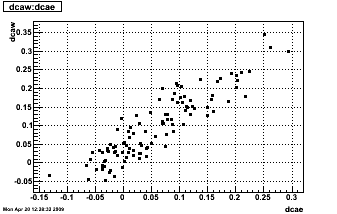
The good news from the plot on the right is that the west side and east side DCAs track each other, so we have no asymmetry issues.
The code takes the used SpaceCharge correction and the remaining DCAs and estimates what the SpaceCharge correction should be. This is plotted here versus the SpaceCharge correction used:
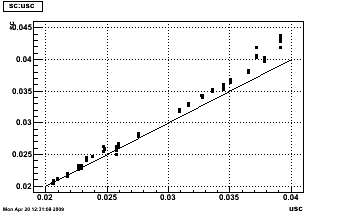
At first glance it might seem that the used correction was a few percent too low. However, if I plot the estimated correction divided by the used correction versus zdcx, we see that the ratio generally increases with luminosity:
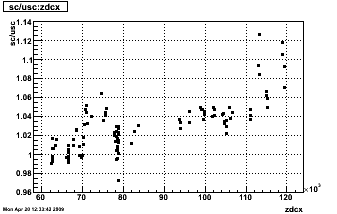
This is an indication that the dependence of SpaceCharge on zdcx has higher order terms and is not strictly linear. This argues in favor of a PCA analysis as was eventually done for the dAu200 (2008) and in finding cuts for corrupt RICH scalers from Run 8 (see "A PCA analysis" comment from Finding a cut for corrupt scalers in Run 8 dAu).
-Gene
- genevb's blog
- Login or register to post comments
